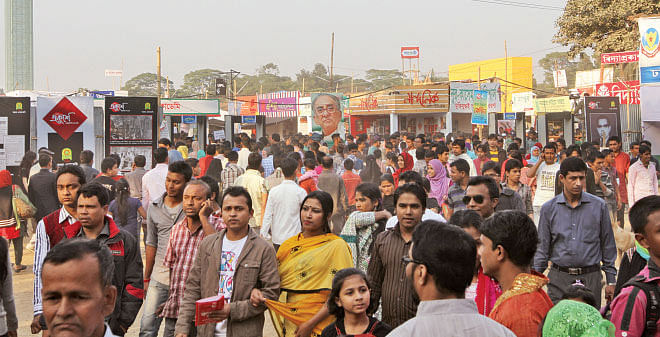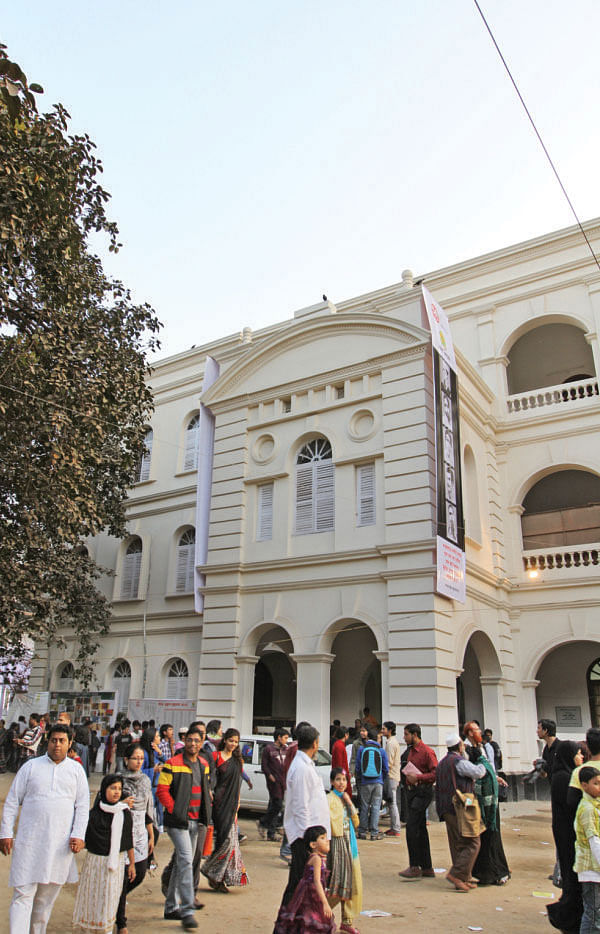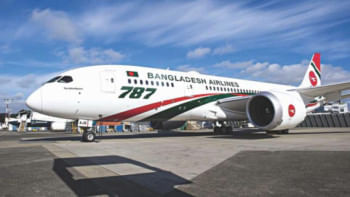FOR THE LOVE OF BOOKS

Three decades ago, the notion of a large-scale, organised book fair in this city seemed wildly implausible.
Viewed as a city that has squandered its natural resources, Dhaka was still a place where you could breathe. The Art scene revival was years away, and the television series “Dhakai Thaki,” an edgy and suspenseful depiction of the vagaries of life in the capital, was yet to make its mark.
Book fairs were scarce. So in 1984, Bangla Academy, with Manzoor-e-Maula as its director general, organised the first official Amar Ekushey Grontho Mela called Ekushey Amar Porichoy, in the spirit of the language movement of 1952.
Now entering its 29th year, the book fair which opened on February 1, and runs for a month, is the largest and by all accounts the most diverse book fair in the country. Authors appreciate the crowd and conviviality; readers appreciate the intimacy and the something-for-everyone offerings, including special visiting hours for children and women and smart phone apps for downloading PDF version of books; and publishers welcome the hundreds of thousands of taka in book sales and the know-how of the people who run the fair that engages the community as a whole for a month.

“This year I haven't yet been to the mela. I will go tomorrow,” says noted poet and writer Syed Shamsul Haq. “The publishers have been telling me that they are satisfied with the management of the fair.”
This year a total of 299 publication houses, government, non-government and autonomous organisations and socio-cultural bodies are participating in the fair through 534 units of stalls some of which have been allotted space in the Suhrawardy Udyan, including 24 for children and teenagers.
The writers, too, are a mix of the well known and less known, from across the literary spectrum bringing out more than 4,000 titles. “My memory of the Boi Mela started in 1981,” recalls Haq, a living legend. “Before that I was in England. I think there were only 30-40 book stalls back then. The middle of the fairground was empty; we used to hang out and interact with readers. It was a homely environment.”
But there was a time when the idea of an entire mela or fair dedicated to books seemed, in polite terms, quixotic to many.
“The pioneer of book fairs in Bangladesh is noted writer Sardar Jainuddin,” says Shamsuzzaman Khan, world renowned folklorist and director general of Bangla Academy. “While an assistant publication officer at Bangla Academy in 1962, one day he came across a book titled “Wonderful World of Books” in which he found the term “book fair.” So there can be fairs for books too! Why not organise one, thought the visionary writer.” Soon after, the then Pakistan government appointed him head of the National Book Centre, East Pakistan branch when Unesco contacted him and proposed that they should invite prominent writers to write on what should be the elements of children's literature with a view to help children develop a reading habit. So in 1964-65, Sardar Jainuddin turned an exhibition of elements of children's literature into a children's book fair, held at the Central Public Library, now known as the Dhaka University library. The crowd poured in from everywhere and Jainuddin wondered why not a book fair for everyone?
This “why not” of Jainuddin would forever change the history of book fairs in Bangladesh.
Coinciding with Unesco's declaration of the year 1972 as International Book Year, he organised an international book fair at Bangla Academy in December of 1972, inaugurated by then president Justice Abu Sayeed Chowdhury. Twelve countries were supposed to participate but publishers from only India, the then Soviet Union, Japan, United States, Bulgaria and Britain came. “A bizarre incident took place during the fair,” says Khan. “A group of angry students changed the name of the US stall to “Vietnam.” It was done to show solidarity with the Vietnamese people who were fighting the US imperialist forces and had also supported our glorious Liberation War which the US had not.
But the history of book fairs in Bangladesh is even farther away in your rear view mirror.
In 1970, in Narayanganj, Sardar Jainuddin organised a book fair where literary giants like Munier Chowdhury and Mohammad Abdul Hai attended. “I remember something funny about it,” says Professor Khan. “Maybe Sardar Jainuddin himself or Munier Chowdhury who had a great sense of humour tied a cow to a pole in the fairground. And on the cow was written, “I DO NOT READ BOOKS.”
It is unclear whether the cow was offended by the joke, but you get the point.
Inspired by its success, three years later, Sardar Jainuddin organised another book fair under the name “The First National Book Fair” at the Gallery Bhaban of Shilpakala Academy. It was an instant hit among the audience and he took the fair to Chittagong, Rajshahi, Khulna, Sylhet, Mymensingh, Dinajpur, Barisal and Bogra. He also organised local book fairs in Jessore, Madaripur and a National Book Fair in Khulna. Shamsur Rahman, actor Gulam Mustafa, Abu Hena Mustafa Kamal and Hasan Azizul Huq were among the luminaries who attended these fairs.
“The same year at the premise of Bangla Academy Ruhul Amin Nizami of Standard Publishers, Chittaranjan Saha of Muktodhara, Tajul Islam of Bornomichil and others sat down with books and started selling them,” says Khan. “Their number grew the following year. That was also the year when Bangla Academy organised the First Literary Congress and about eight to nine book stalls were set up including one by the Bangla Academy. Bangabandhu inaugurated the programme with poet Jasimuddin presiding over the event. Artist Jainul Abedin and Bose Professor Abdul Matin Chowdhury were special guests. During this fair, several sessions were presided over by Dr Muhammad Qudrat-i-Khuda, Dr Badruddoza Chowdhury, Abu Jafar Shamsuddin and other eminent people.” A year later, in 1974, six countries sent delegations to the fair: a delegation of 75 including Subhash Mukhopadhyay, dramatist Monmotho Roy, Sunil Gangopadhyay, and led by Annada Shankar Ray came from India. “During 76-77 no fair was held but a lot of journals were published by student organisations,” says Khan.
ardar Jainuddin was the pioneer of the book fair in Bangladesh but it was Chittaranjan Saha of Muktodhara who gave it a professional foundation,” says Professor Khan. “Publishers did not have manuscript editors, efficient proof readers or layout designers; nor was there any good book reviewer. So he set up an editorial board with Professor Abdul Hafiz as the chief editor. Saha went to Japan to attend the annual book development programme and received training on editing, proof reading, reviewing and other related tasks. And the following year he sent Abdul Hafiz. His goal was to give publishing a professional foundation through seminars, workshops and training.”
Thus in this backdrop of sporadic book fairs and the absence of a professional infrastructure , the demand for a well planned Ekushey Boi Mela started gaining momentum. The 1974 fair lasted only eight days. Impressed with the size of the audience, publishers demanded that the fair go on for a month. But who would take the lead in putting together such a huge initiative? By definition, it is the responsibility of the National Book Centre. “But considering their limited resources, pressure was on Bangla Academy to organise it,” says Shamsuzzaman Khan. “But we lose three to four months every year in preparation of the fair which is a huge logistical challenge. So publishers may start sharing the cost and some of the responsibilities like garbage disposal or watering the fairground.”
Most publishers share this view. Farid Ahmed, publisher, Somoy Prakashan says, “The committee responsible for holding the fair is well represented by various interest groups. If the committee decides that publishers should share responsibilities, it can be done. If the committee takes the right decision at the right time, the operation of the fair activities will run smoother.” Ahmed is also an ex-general secretary of Academic and Creative Publishing Association of Bangladesh.
In most countries book fairs are organised by publishers. In Pakistan, the Karachi International Book Fair is organised by Pakistan Publishers and Booksellers Association in collaboration with National Book Foundation. And in Kolkata, it is the Booksellers and Publishers Guild. Farid Ahmed says that the process of Bangladeshi publishers organising book fairs has already started. “In 2011, 2012 and 2013, in Kolkata, our association organised a Bangladesh Book Fair where about 30 publishers took part. People loved it. The fair made headlines in all newspapers of Kolkata-Bangla, English, Urdu and Hindi. We also arranged a book fair in 2003 at the Shilpakala Academy and all SAARC countries participated.”
Mohiuddin Ahmed, publisher of the University Press Limited, has been a long time advocate of book fairs being organised at private initiatives. “No one has to nurse the publishers who should compete in the market and survive based on the quality of their books. We need implementation of the National Book Policy.”
Perhaps that's where the problem lies.
In a report tiled Book Publishing in South Asia-Status and Prospects (Asian/Pacific Book Development (ABD) volume 30, issue 3, 2000), Asia-Pacific Cultural Centre for Unesco (ACCU) writes, “Bangladesh is the only country in South Asia with a comprehensive National Book Policy. Its major recommendations include production of suitable books for mass literacy and sustained reading, encouragement of the publication of quality books for children and juvenile readers, needs-based liberalised import and targeted export of books, training programmes for book industry personnel, upgrading of the existing National Book Centre, often headed by non-professionals, into a full-fledged Book Development Council, effective implementation of copyright laws and library legislation. A high-level committee consisting of experts and professionals has been formed to monitor the implementation of the book policy. The committee does not seem to have met so far and the book policy remains just a blueprint...Most publishers concentrate on textbook publishing for higher secondary and university levels and cheap help-books for passing the examination. Lack of copyright protection and absence of a library network to support and develop the reading habit are other constraints in book development.”
This year the fair has been extended to the Suhrawardy Udyan to cater to a wider audience and to include more publishers. “Although the book fair personifies the spirit of the language movement, our struggle did not stop with Ekushey,” says Professor Khan. “It was manifested in the struggle for autonomy, the six-point movement, the mass movement of 1969, and the March 7 speech of Bangabandhu--all that culminating in the liberation war. So we are taking the fair to the Suhrawardy Udyan, home of the monument of independence and shikha chironton, a reminder of our continuous struggle for freedom.” Syed Shamsul Haq says he is content that this day has come. “In 1994, in my column Hritkolomer Taane, I proposed so.”
In the beginning, organisers tried to give Ekushey Grontho Mela an international flavour but over the years it has become a platform exclusively for Bangladeshi books. “It's hard to hold an international book fair in a country that does not have readers of other languages,” says Mohiuddin Ahmed of UPL. “We do not have many readers of the English language, let alone French, German or Spanish. Even in Kolkata you will find readers in these languages. Publishers of other countries will only come when they can sell their books.” That makes sense considering the poor cultivation of the English language in the country. But what about Bangla books from other parts of the subcontinent? Syed Haq says, “In a few days, Jatiya Grontho Kendra will arrange a book fair. They should invite publishers from Assam and Tripura, not only from Kolkata. For example, Shilchar of Assam is a thriving centre of Bangla literature. And at any book fair readers should be able to interact with writers and learn.”
The seeds of the book fair which fell on the ground of Bangla Academy have now grown into a giant tree. “I think publishers should eventually start organising the fair. But Bangla Academy will always play a vital role in it,” concludes Syed Haq.

 For all latest news, follow The Daily Star's Google News channel.
For all latest news, follow The Daily Star's Google News channel. 



Comments